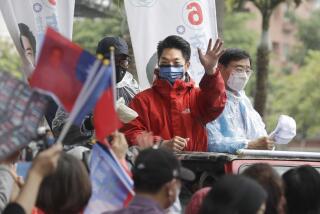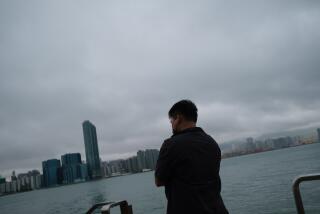Incoming Leader Plans a Different Hong Kong
- Share via
HONG KONG — Tung Chee-hwa, the shipping magnate who will take Hong Kong’s helm when it reverts to China on July 1, has a vision for how this international city should move forward.
In the new Hong Kong, he says, fewer votes will be cast, street protests will be restricted, and ties to foreign political groups will be limited. That will focus efforts on Hong Kong’s key goals: to make more money and to support China.
To critics here and overseas watching the territory’s trajectory as its British colonial masters prepare to hand it back to Beijing, the planned contraction of political involvement seems a step backward for one of the world’s most vibrant and sophisticated societies.
But not to Tung, a stocky tycoon with a no-nonsense crew cut who on Monday held his first major interview with foreign journalists since being named to the chief executive post in December. He said his business experience has taught him an appreciation for long-term strategy and the bottom line. And the bottom line, to Tung and to Beijing, is social stability and prosperity for Hong Kong--even at the expense of some political rights.
“The worst thing,” said Tung of his city, where public protests occur peacefully but frequently, “is that you see the whole issue of order start to slide. I lived in America in the ‘60s and I saw what happened: the slow erosion of authority and the society becoming less orderly than is desirable. I certainly don’t want to see this happen.”
Hong Kong’s primary interests, Tung said, are economic. “Really, the biggest challenge is how can we keep on making Hong Kong competitive, because I want to continue to create wealth for the 6.5 million people in Hong Kong. I want 21st century Hong Kong to be much more successful than today.”
As Tung sketches the path for Hong Kong’s success, he is scrambling to find his own way as its leader. The avuncular businessman, who was plucked from his post as CEO of a family shipping business to become chief executive, has had to learn the niceties and discomforts of politics on the fly.
Tung, who will turn 60 this month, has mastered the meaningful handshake and is quick to use first names of new acquaintances. More slowly, he is learning to deal with the intensive attention that goes along with changing the course of a world trading center and the lives of its people.
“The responsibility is really enormous,” he said.
Chosen for his international experience and partly for his favor with China, Tung finds himself trying to smooth ties between Washington and Beijing, which he predicts will be “the most important relationship in the 21st century.”
Hong Kong is caught between the two powers, which are drawn together by business but separated by ideology, and affected by the ebb and flow of their ties. At stake next month: the annual tussle over U.S. renewal of China’s most-favored-nation status, a trade privilege that used to be contingent on Beijing’s human rights performance.
“MFN should really be renewed permanently,” said Tung. “It’s good for China. It’s good for Hong Kong. And if I may add, it’s good for the United States of America.” Tung predicts “common sense will prevail” and business will continue as usual.
But so, he realizes, will differences over the importance of human rights and Hong Kong’s role as the stage on which these conflicts are played out.
The U.S. Congress will make an annual progress assessment of Hong Kong to ensure that China keeps its promise of autonomy for Hong Kong’s next half a century. The British government has vowed to watch over its former colony and the fledgling freedoms granted only in the last few years. China warns foreign leaders to mind their own business.
Tung welcomes foreign interest--to a point. “Hong Kong is a small place and it is vulnerable,” he said, justifying proposed legislation to ban foreign support of local political parties. “We have to look at the interests of 6.5 million people.”
The draft bills have drawn strong opposition from local lawyers, academics and politicians. The final versions of the new laws, which Tung says will reflect public reaction, are expected to be announced later this week.
Hong Kong’s electoral arrangements will also be changed after the hand-over. Professionals are now granted two votes instead of one, to reflect their added contribution to the territory; after the hand-over, only the most elite will have more than one vote.
Tung, who has declared his admiration for the authoritarian style of Singaporean leader Lee Kuan Yew, expressed a desire to decide what’s good for the society and to just “get on with it.”
“What one has to do as a leader,” he declared Monday, “is make decisions which are in the long-term interests of the society as a whole and be responsible for the consequences.”
More to Read
Sign up for Essential California
The most important California stories and recommendations in your inbox every morning.
You may occasionally receive promotional content from the Los Angeles Times.










